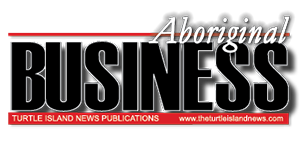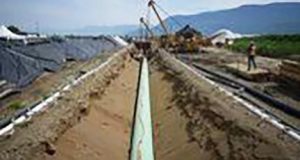By Sanuda Ranawake
Local Journalism Initiative Reporter
Jolene Ashini will soon be the first Labrador Innu person to be called to the bar in Newfoundland and Labrador. Ashini currently lives in Ontario where she completed her education and will soon be called to the bar in Ontario. Following this, she will begin her application to be called to the bar in Newfoundland and Labrador.
Among her many achievements, she was also awarded the Royal Society of Canada’s Justice Rosalie Silberman Abella Prize, which, according to Ashini, “is awarded to graduating law students in each Canadian law school, who are most likely to positively influence equity and social justice, and Canada, or globally upon graduation.”
Ashini said being a lawyer was something she always knew was coming.
“It was something that was at the back of my mind since I was very small because my father was the late Daniel Ashini,” she said.
Ashini said it was seeing her father’s activism in her younger years that influenced her to follow a career in law.
“He was an integral part of the movement to fight for rights and recognition for the Innu of Labrador to be under the Indian Act,”
she said. “With that, he made connections to law firms and the Innu Nation, and the band council decided to retain Olthuis Kleer Townshend, which is where I am currently employed right now.”
She said her father and her family’s connections to a law firm always exposed her to lawyers and the legal profession.
`In Labrador back in the early 1990s, the hotel situation was quite sparse. So, John Olthuis, the founding partner of Olthuis Kleer Townshend, would stay at our home every single time he came into Labrador for rights negotiations and land negotiations and stuff like that.”
With that Ashini was exposed to lawyers on a daily basis.
`I’ve been pretty influenced all my life to understand the importance of Indigenous rights and Indigenous obligations and
Aboriginal law as a vital part of how we conduct ourselves.”
When asked about her father, Ashini speaks extremely positively.
Ashini says he was not only a role model for her, but for everyone in the community.
“He was chief of our community for a couple of terms and then he was also Deputy Grand Chief of the Innu Nation at one point, and he remained until his death as a treaty negotiator for the Innu.”
Jolene Ashini’s graduating photo from law school with her family.
Ashini sees her father as a leader in the community and a person she could look up to.
“He was the one who really inspired me to look forward and to really understand how important, not just having an education in nushimit, which is on the land, but also having a westernized and colonized form of education to be able to fight the fight with the right tools,” she said.
Ashini said it was her father that inspired her to pursue a Westernized education.
“He was a big advocate for my sister and I to go to school and make something more so we can sit at the table with those people and really be understood and taken seriously. Because unfortunately without a westernized education you can’t be taking that seriously when you’re sitting across from the table.”
Ashini says she hopes to take her father’s work to the next level and follow in his footsteps in improving the lives of Innu people.
She said while she’s open to the approach she takes, she will be using her legal career to help the Innu of Labrador.
“Whether it’s on the ground, on the front lines or sitting at the table with the government and helping in anything from as simple as policy creation to government and legal structures of what organizations should do and how they should operate or assisting in any possible way that I can,” said Ashini
Before law school, Ashini was a geologist. She said she was good at it and showed interest in it from her early days in university.
“I started university at Acadia University and my idea going into school was to try to get a background in education that would help me go into law school,” said Ashini. “Then I picked up a geology course and then the next semester I picked up another geology course and then I realized I was not only doing better in a hard science, but I was also academically doing way better.”
Even as a geologist she found herself working towards helping communities and talking about the social impacts of geology.
`Even though I’ve taken science and graduated with a geology degree, in my science classes I was writing papers on impacts of communities and taking the social impacts and putting them into my work,” said Ashini. “So even though I thought I may have been running away from my career in law, I was still applying it to my science”
Ashini then decided to pursue law school entering the University of Victoria’s Joint Indigenous Law and Common Law program.
Ashini said her dream would be to live in Labrador and to help the people there, and that dream is not far from reality.
“I definitely see my future continuing as a lawyer, especially for the Innu Nation, and fortunately my law firm also represents Mushuau Innu First Nation and the Sheshatshiu Innu First Nation,” she said. “So, I get to spend a lot of time in Labrador.”
Ashini is thankful for her current employer, the law firm Olthuis Kleer Townshend. The same law firm whose partners her father hosted many years ago.
“My firm has been so extremely accommodating and it’s been something that we’ve been talking about even when I first joined that to have me on the ground here in Labrador would be a really huge benefit. So, there are definitely plans for me to move home permanently in the future.”
She said she has faced no discrimination at her current workplace, something she can’t say about the past.
Ashini wants to empower indigenous youth and plans to do that from the start. She says there needs to be more indigenous people in the legal field.
“I really want to empower Indigenous youth and others and take a mentoring role to not only just meet any expectation in the legal field, but sort of go beyond and go further. The youth here are incredible and they have such a promise going forward.”
She said advocating for youth and being a role model is something she will juggle with her legal career for years to come.
Ashini said she is proud to be a woman and stands up for women’s rights whenever she can. She wants more and more young indigenous girls and women to look up to her and know they too can achieve what she did.
“Now I’m seeing so many, especially Innu women leaders and heads of departments. Innu previously and prior to contact and colonization were very gender equal people, both women and men made decisions together and it wasn’t necessarily a man that made a decision.”
She said she has always been looking to break down barriers and boundaries.
“What you see on TV is these male lawyers doing this stereotypical thing. But then there’s something that always wanted me wanted me to break barriers because I was also a woman in science in the early 2000s where that was unheard of.”
She said there is much more work to do, but she says Innu women are already making strides, herself included.
“I really want Innu women to really understand that there is so much more to life and that you can do so much, and you can break barriers,” said Ashini. “No matter what age you are that you can go back to school and things can be done and you can break down those barriers and also attain things like law degrees or become a doctor or a teacher, a nurse, or whatever it is that your dreams are.”
She said community is what she is most thankful for, and that people should continue to help each other. Even when self-doubt sets in, she says it’s people that uplift each other.
“I think that we are capable of so much more than we know, and I am the biggest doubter of myself and the biggest doubter of what I can achieve.”
When asked about what community can do to people, she said, look towards her as an example.
“But here I am approaching my call to the Ontario bar and then being a lawyer in a firm that I’ve looked up to for so long that I think that we just need to rely on each other to get each other through and that we are capable of so much more than what we see and what we feel or what we think we’re capable of.”
She thanks the community that surrounds her and says she is lucky
“I think that I’m so fortunate to come from a community that talks so highly of me and hold me up when I feel like I can’t go any further.”
Ashini now awaits being called to the bar in Ontario. She will then begin her application to be called to the bar in Newfoundland and Labrador.
Sanuda Ranawake/ Local Journalism Initiative Reporter/THE TELEGRAM/LJI is a federally funded program.
 Aboriginal Business Magazine Your source for Aboriginal Business News
Aboriginal Business Magazine Your source for Aboriginal Business News



